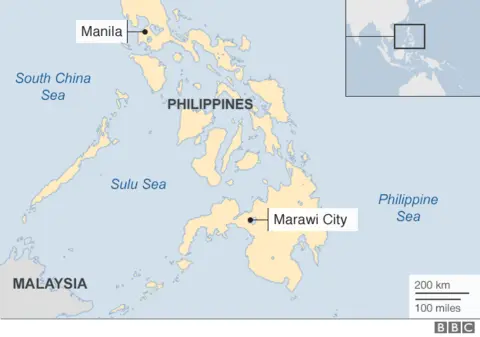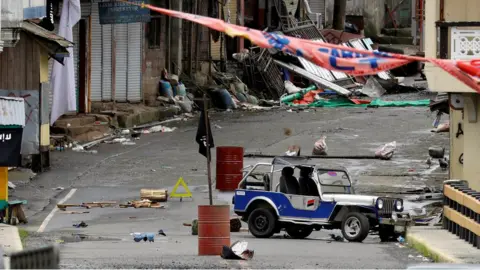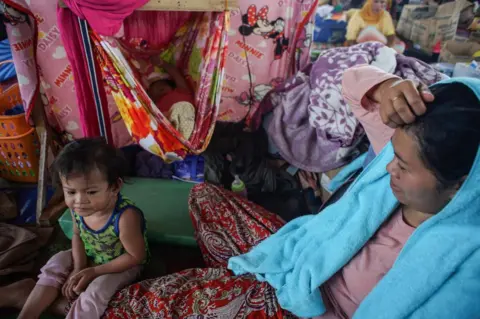Marawi siege: Philippine militants 'stockpiled food and weapons'
Islamist militants who have overrun parts of the Philippine city of Marawi have prepared for a long siege, officials said.
Security forces have been trying to flush out the gunmen since they attacked the city two weeks ago.
The militants are hiding in tunnels and basements with stockpiles of food and weapons, military officials said.
The conflict has killed at least 170 people, including 20 civilians, and more than 180,000 residents have fled.
Hundreds of civilians are believed to still be trapped with few supplies.
Read more: Starving residents tell of terror in Marawi
The government, which has been conducting airstrikes, had earlier claimed it had "made gains" in the battle, but has yet to fully retake the city.

Senior military officials told reporters that they believed the militants were hiding in an extensive network of underground shelters, built years ago.
"There are underground tunnels and basements that even a 500-pounder (bomb) cannot destroy," said Maj Gen Carlito Galvez, head of the military command in the Western Mindanao region.
Government and military estimates on the number of militants left in Marawi have ranged from 40 to 200.
 Reuters
ReutersIn other developments:
- The Philippine government has denied claims that its soldiers were looting Marawi, saying that troops had handed in more than 79m Philippine pesos (£1.2m, $1.6m) in cash and cheques found in a house used by militants.
- President Rodrigo Duterte has increased the bounties for top militant leaders Isnilon Hapilon and the Maute brothers, with a total of 27.4m pesos now offered for their "neutralisation". The US is offering a separate $5m bounty for Hapilon.
- The US is supplying weapons, including machine guns and grenade launchers, to the Philippines which has said they will go to soldiers fighting in Marawi.
- Officials had said that foreign nationals were among the militants in Marawi, but the list of countries now includes Saudi Arabia, Indonesia, Malaysia, Yemen, India and Chechnya.
The militants were also apparently well-prepared for a possible siege, and had placed supplies in mosques and religious schools - which are off-limits for air strikes - days before seizing the city, said officials.
 EPA
EPAMilitary spokesman Lt Col Jo-ar Herrera told AFP news agency that these buildings contained at least a month's worth of food, as well as weapons such as machine guns.
The gunman had also collected ammunition and provisions from the city after ransacking Marawi's jail and armouries, said presidential spokesman Ernesto Abella who was quoted in The Philippine Inquirer.
When the conflict first broke out, officials had said fighters from the Maute group, linked to the so-called Islamic State, stormed the city after an attempt by Philippine troops to capture Hapilon.
The Maute group is named after founders and leaders Abdullah and Omar Maute.
